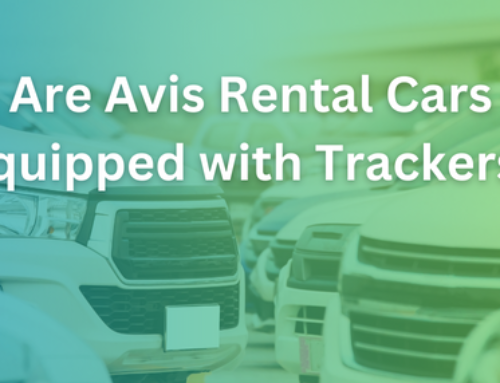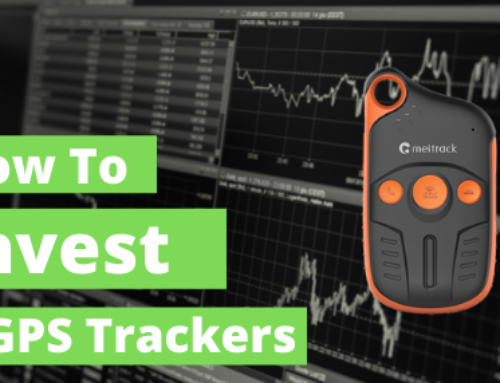How GPS Trackers Empower Big Rig Trucks: The Game-Changing Benefits You Need to Know
Are you curious about how GPS trackers are transforming the world of big rig trucks? Look no further, because in this article we will explore the game-changing benefits that these innovative devices empower truck drivers with. From enhanced fleet management to improved safety, GPS trackers have become an indispensable tool for the modern trucking industry.
With the ability to track vehicles in real-time, GPS trackers offer unparalleled visibility into the operations of big rig trucks. Fleet managers can monitor location, speed, and route deviations, ensuring optimal efficiency and timely deliveries. Additionally, GPS trackers provide invaluable data on driver behavior, allowing for improved performance and reduced operational costs.
The benefits of GPS trackers go beyond mere logistics. They play a crucial role in ensuring the safety of both truck drivers and the public. With features like geofencing and alerts for speeding or sudden stops, these trackers help prevent accidents and enable swift emergency response.
In conclusion, the integration of GPS trackers has revolutionized the trucking industry. From optimizing fleet management to ensuring the safety of drivers and cargo, these devices have become an essential tool for big rig trucks. So, hop on board and discover how GPS trackers can empower your trucking operations.
Improved fleet management with GPS trackers
Efficient fleet management is crucial for the success of any trucking company. With the ability to track vehicles in real-time, GPS trackers offer unparalleled visibility into the operations of big rig trucks. Fleet managers can monitor location, speed, and route deviations, ensuring optimal efficiency and timely deliveries.
By having access to accurate data on vehicle location, fleet managers can make informed decisions to optimize routes, reduce idle time, and minimize fuel consumption. This level of control and oversight allows companies to streamline their operations and maximize productivity.
Furthermore, GPS trackers provide invaluable data on driver behavior. Fleet managers can monitor factors such as harsh braking, speeding, and idling, which can be used to identify areas for improvement and implement driver training programs. This not only improves overall driver performance but also helps to reduce operational costs by minimizing vehicle wear and tear, fuel consumption, and insurance premiums.
Increased driver safety and security
The safety of truck drivers and the public is of paramount importance in the trucking industry. GPS trackers play a crucial role in ensuring the safety and security of both drivers and cargo.
One of the key features of GPS trackers is geofencing, which allows fleet managers to set virtual boundaries for their trucks. If a truck deviates from its designated route or enters an unauthorized area, an alert is triggered, enabling fleet managers to take immediate action. This not only helps prevent theft but also ensures that drivers stay on course, reducing the risk of accidents or delays.
Moreover, GPS trackers provide real-time alerts for speeding or sudden stops. This allows fleet managers to address any safety concerns promptly, ensuring that drivers adhere to traffic regulations and drive responsibly. By monitoring driver behavior, companies can enhance their safety protocols, provide targeted training, and ultimately create a culture of safety within their organization.
Optimized route planning and fuel efficiency
Efficient route planning is crucial for big rig trucks, as it directly impacts fuel consumption, delivery times, and overall operational costs. GPS trackers offer advanced route optimization capabilities, allowing fleet managers to identify the most efficient paths for their trucks.
By analyzing traffic patterns, road conditions, and other relevant data, GPS trackers can generate real-time route updates and alternative routes in case of unexpected events. This helps drivers avoid congested areas, road closures, or other obstacles, saving both time and fuel.
Additionally, GPS trackers provide accurate estimates of arrival times, allowing fleet managers to provide customers with reliable delivery schedules. This not only improves customer satisfaction but also helps companies maintain a competitive edge in the industry.
Enhanced vehicle maintenance and performance monitoring
Proper vehicle maintenance is essential to ensure the longevity and performance of big rig trucks. GPS trackers provide valuable insights into vehicle diagnostics and performance, allowing fleet managers to stay on top of maintenance schedules and address any potential issues promptly.
By monitoring engine data, fuel consumption, and mileage, GPS trackers can detect anomalies and notify fleet managers when maintenance is due. This proactive approach to vehicle maintenance helps prevent breakdowns and costly repairs, ensuring that trucks stay on the road and deliveries are not delayed.
In addition, GPS trackers can track the utilization of vehicles, allowing fleet managers to identify underutilized assets or potential bottlenecks in their operations. By optimizing vehicle usage, companies can maximize their resources, reduce unnecessary expenses, and improve overall efficiency.
Real-time tracking and asset recovery
The ability to track big rig trucks in real-time is one of the most significant benefits of GPS trackers. With the precise location information provided by these devices, fleet managers can monitor the progress of their shipments and provide accurate updates to customers.
Real-time tracking also enables fleet managers to respond swiftly to any unforeseen events or emergencies. In the event of theft or unauthorized use, GPS trackers can help locate and recover stolen assets, minimizing financial losses for the company.
Moreover, real-time tracking allows for efficient dispatching and coordination of resources. Fleet managers can assign the closest available truck to a new pickup or delivery request, ensuring optimal utilization of their fleet and minimizing response times.
Compliance with regulations and legal requirements
The trucking industry is subject to numerous regulations and legal requirements, and non-compliance can result in severe penalties and reputational damage. GPS trackers provide a valuable tool for ensuring compliance and meeting regulatory obligations.
By accurately tracking vehicle data such as speed, hours of service, and driving behavior, GPS trackers help companies demonstrate adherence to regulations. This data can be easily accessed and used for reporting purposes, inspections, or audits.
Additionally, GPS trackers provide electronic logging capabilities, eliminating the need for manual logbooks. This not only reduces administrative burdens but also ensures accurate and tamper-proof records, further enhancing compliance and reducing the risk of fines.
Choosing the Right GPS Tracker for Big Rig Trucks
1. Consider your tracking needs
When selecting a GPS tracker for your big rig trucks, it’s crucial to consider your specific tracking needs. Evaluate the features that are most important to your operations, such as real-time tracking, geofencing, or driver behavior monitoring. By identifying your priorities, you can narrow down the options and choose a GPS tracker that aligns with your requirements.
2. Evaluate the hardware and software compatibility
Before making a final decision, ensure that the GPS tracker you choose is compatible with both your truck’s hardware and the software used by your fleet management system. This compatibility is essential to ensure seamless integration and efficient data transmission. Consider consulting with your fleet management provider to identify the most suitable GPS tracker options for your big rig trucks.
3. Assess the reliability and durability
Given the demanding nature of the trucking industry, it’s crucial to choose a GPS tracker that is reliable and built to withstand the rigors of the road. Look for devices that are designed to handle harsh weather conditions and vibrations. Additionally, consider the battery life and whether the GPS tracker offers backup power options to ensure uninterrupted tracking.
4. Analyze the data reporting capabilities
The effectiveness of a GPS tracker lies in its ability to provide accurate and comprehensive data reporting. Look for trackers that offer detailed reports on various metrics, such as distance traveled, fuel consumption, and driver performance. These insights can help you identify areas for improvement and optimize your operations for better efficiency and cost savings.
5. Consider the cost and scalability
While cost is an important factor to consider, it should not be the sole determining factor when choosing a GPS tracker. Evaluate the overall value that the device provides in terms of features, reliability, and support. Additionally, consider the scalability of the solution. As your fleet grows, you may need to add more vehicles to the tracking system, so choose a GPS tracker that can accommodate future expansion.
6. Seek recommendations and reviews
To ensure you make an informed decision, seek recommendations from other trucking industry professionals or read online reviews of different GPS trackers. Real-world experiences and feedback can provide valuable insights into the performance, reliability, and customer support of various devices. By leveraging the experiences of others, you can make a more educated choice for your big rig trucks.
—
Conclusion: The Future of GPS Trackers in the Trucking Industry
GPS trackers have undoubtedly revolutionized the trucking industry, providing unparalleled visibility and control over fleet operations. The benefits they offer, including enhanced fleet management and improved safety, have become crucial for maximizing efficiency and reducing costs.
As technology continues to advance, the future of GPS trackers in the trucking industry holds even more exciting possibilities. With the integration of artificial intelligence and machine learning, GPS trackers can further optimize route planning, driver scheduling, and fuel consumption. Predictive analytics capabilities can help identify potential maintenance issues before they lead to breakdowns, saving time and money.
Moreover, the emergence of connected vehicle technology and the Internet of Things (IoT) opens up new avenues for GPS trackers. Integration with other devices and systems, such as tire pressure monitoring sensors and temperature control systems, can provide real-time information and help prevent costly breakdowns or cargo spoilage.
In conclusion, GPS trackers have become an indispensable tool for big rig trucks. Their ability to provide real-time tracking, monitor driver behavior, and enhance safety has transformed the trucking industry. By choosing the right GPS tracker for your fleet, you can unlock a world of benefits and empower your trucking operations for greater success. Embrace the power of GPS trackers and stay ahead in the ever-evolving world of big rig trucking.
—
Disclaimer: The information provided in this article is for informational purposes only. The use of GPS trackers and related technologies should comply with applicable laws and regulations. Always consult with professionals or legal advisors for guidance specific to your situation.





